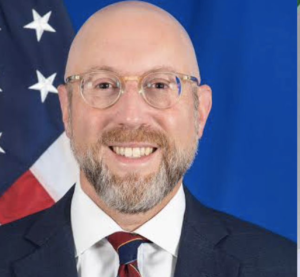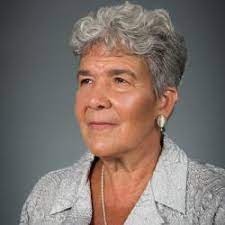
The Under Secretary of Commerce for International Trade, U.S. Department of Commerce, Marisa Lago, Wednesday in Lagos, explained the criteria for choosing Ghana, Nigeria and South Africa for her recent Global Diversity Export Initiative Trade Mission .
The Under Secretary, who spoke at a virtual media briefing coordinated by the U.S. Africa Media Hub in South Africa, said the three countries she visited in the recently-concluded GDEI Trade Mission were very strategic to the goals and objectives of the U.S Commerce Department on international trade and investment partnerships with African countries.
Under Secretary Lago, who was joined at the briefing in Lagos by the Chargé d’Affaires, U.S. Mission to Nigeria, David Greene, said: “When we selected the particular countries for this trade mission, we were looking to ensure that we included some of the largest economies on the African continent. We wanted to make sure that we selected countries whose economies had a strong presence in sectors that had strong prospects for U.S. companies, where there was the ability to match up the U.S. companies on this trade mission with companies in those countries.”
The Under Secretary noted that she also had on the Trade Mission to the three African countries some of the leading chambers, business organisations, that represent the black community, the Native American/Indian community, and the woman-led business community, saying “through these trade missions, we are reaching thousands of other businesses in the U.S.”
Lago explained the criteria used in arriving at the countries visited further: “The other thing that we did is we reached out to the Commerce Department’s strategic partners to ask them where they thought there would be opportunities for the trade mission’s participants who came from historically underserved communities.
“Now, as I mentioned, we are already looking forward to future trade missions, and we will continue looking to visit other countries on the continent as well. Our mission is to support the competitiveness of U.S. businesses and their workers, and this includes micro, small, and medium-sized enterprises and also tapping into the very strong African diaspora which we have in the United States and which is a source of our strength and also a point of pride. “
According to Lago, “The Biden-Harris administration has made a renewed commitment to deepening engagement across the African continent during – which was made during last December’s U.S.-Africa Leaders Summit hosted by President Biden in Washington, D.C. Since then, there have been numerous high-level visits to the continent, including Vice President Kamala Harris, First Lady Jill Biden, Secretary of State Antony Blinken, Treasury Secretary Janet Yellen, U.S. Ambassador to the United Nations Linda Thomas-Greenfield, and in the last month alone the CEO of the U.S. Development Finance Corporation, Scott Nathan, and the head of the U.S. Trade and Development Agency, Director Enoh Ebong, and Acting Deputy Secretary of State Victoria Nuland – a very high, sustained pace of senior-level government visits.
“So that said, our engagement or vision for deepened engagement with Africa entails a lot more than just high-level visits. We are laser-focused on delivering tangible results across all dimensions of our bilateral relationship, as well as our partnerships with subnational and pan-African institutions. And I’m pleased to report that if we look just in terms of trade and investment, since December’s leaders summit and the U.S.-Africa Business Forum that the Commerce Department organised, the Biden-Harris administration has helped close 75 new deals between the United States and African countries. We estimate that the total values of these deals result in $5.7 billion in two-way trade and investment.
“To underscore the Commerce Department’s role in this whole-of-government commitment, I’ll repeat what I said earlier: While my role is global in scope, this is my fourth official visit to the African continent since the beginning of this year. In February, I traveled to Tanzania, where I engaged with government officials and U.S. and Tanzanian CEOs, startups, and other local private sector leaders, where we discussed the business environment in that country.
“From Tanzania, I moved on to Zambia, meeting with President Hichilema, hosting a roundtable for women entrepreneurs, meeting with key government leaders from several ministries and helping to lay the groundwork for the signing of a memorandum of understanding – an MOU – on commercial development with Zambia. This MOU was formalized and signed shortly after Vice President Harris visited Zambia in March.
“Fast-forward to May, I traveled to Cairo to hold the inaugural meeting of the U.S.-Egypt Joint Economic Commission. There we established several areas to intensify our commercial cooperation.
“Later the same month, in the last days of May, I traveled to Abuja, Nigeria, as part of the U.S. presidential delegation to attend the inauguration of President Tinubu.”
Lago maintained that the U.S. Department of Commerce views these engagements as well as the GDEI Trade Mission “as important steps in continuing to deliver on the commitments that we made at last December’s U.S.-Africa Leaders Summit and Business Forum,” even as she revealed that “this trade mission has brought over 20 U.S. companies and organisations, mostly owned by members of the African diaspora in the United States,” adding, “These companies are active in a wide range of sectors, starting with the information and communications technology sector, cybersecurity, electric vehicles, energy, trade facilitation, and consumer goods. ”
The U.S Under Secretary continued: “While these U.S. companies have been on this trade mission in Africa, the Commerce Department has arranged for them a robust series of tailored match-making opportunities with potential business owners – with potential business partners in these three countries. We have also introduced them to the decision-makers in South Africa, Ghana, and Nigeria.
“This trade mission serves as an example of how intentionally we’re working to deepen and sustain connections between U.S. and African companies. We see trade missions like these as a foundational means of business-to-business relationship building as well as an important mechanism to foster ties that lead to concrete trade and investment deals.
“Over the course of this trip, I’ve also advanced policy objectives aimed at aligning our U.S. approaches with those of the governments of South Africa, Ghana, and Nigeria. What is the goal? To mitigate potential barriers that can hamper trade and investment. For example, in South Africa, I engaged with my government counterparts and private sector colleagues to explore potential solutions and opportunities in the infrastructure, healthcare, and ICT sectors with a special focus on supporting women in technology fields. In honour of South Africa’s National Women’s Day, I met with South African tech entrepreneurs at WomHub, which is a pan-African incubator for female founders in STEM – science, technology, engineering, and mathematics – where we discussed opportunities for early and mid-stage startups to find opportunities for advancement and to be able to scale up in the U.S. market.
“I also met with several established women business leaders to learn from their experiences, to hear about their challenges, and also the opportunities that they saw in the South African market. In Accra, we participated in the inaugural U.S.-Ghana Business Expo, which was hosted by the American Chamber of Commerce in Ghana. This expo featured a trade pavilion that was buzzing with exhibitors from the companies on our trade mission but also about an additional 20 U.S. companies that already have a presence in Ghana, and they were able to showcase to the Ghanaian business community their innovative products and services. The U.S. companies on this trade mission also held dozens of business-to-business meetings with Ghanaian companies to explore new business conversations.
“In my conversations with both the U.S. private sector and my Ghanaian Government counterparts, we discussed the role that U.S. companies can play in Ghana’s economic recovery and the importance of addressing business environment concerns, including settling significant arrears in payments to U.S. critical infrastructure companies. We held discussions focused on commercial solutions to cybersecurity challenges and also scaling electric vehicle charging in Ghana. We also were able to bring together the distinguished heads of prominent U.S. black-led business chambers with the heads of chambers from underserved business communities in Ghana, where they were able to engage in relationship building, peer mentoring, and sharing best practices.
“Coming to my visit to Nigeria yesterday and today, I participated in an incredibly lively hack-a-thon that was hosted by Microsoft’s Garage, where we were focused on how to grow and promote the development of the electric vehicle, the EV industry. Microsoft’s Garage is a center for company employees, customers, partners, and the public to collaborate in STEM fields.
“There were conversations – I’m sorry. Across all of these countries that we visited, there was a consistent focus on the digital economy. I heard directly from my government counterparts and the private sector on the opportunities and challenges in the digital sector. These conversations with our African partners already are and are going to remain critical to advancing progress under the U.S.’s Digital Transformation with Africa, or DTA. This is an initiative that President Biden announced at last September’s U.S.-Africa Business Forum. DTA aims to expand digital access and literacy, and also to strengthen the digital-enabling environments across Africa, all in line with the African Union’s Digital Transformation Strategy and the U.S. Strategy Towards Sub-Saharan Africa.
“I’ll also want to note that today, I was delighted to facilitate a discussion with a group of leading Nigerian women in technology. It was graciously hosted at 21st Century Technologies, a digital infrastructure and services company. We discussed best practices for increasing access for women entrepreneurs to venture capital and other resources, to overcome the historic challenge of gross underinvestment in women-owned and women-led businesses. During our discussion, I was heartened to see the strong relationships already being formed among our trade mission participants and Nigerian entrepreneurs, fostering deeper commercial collaboration and uplifting women in our communities.
“As we move forward, the U.S. Commerce Department is going to continue bringing U.S. companies to the continent, engaging in these critical dialogues – which will foster an enabling environment for increased trade and investment – and also working towards our shared goal of mutual economic prosperity for citizens of both of our nations.”
Chargé d’affaires, U.S. Mission to Nigeria, Greene, commented generally on what he described as his country’s commitment to enduring partnership with Nigeria even as he highlighted the objectives and importance of the GDEI .
“This is a very exciting time in the U.S.-Nigeria bilateral relationship, especially on the economic front, with the Tinubu administration taking and undertaking some of the structural changes that we think will create the foundation for new influxes of U.S. capital investment and increase two-way trade with Nigeria, and we’re already seeing a renewed interest by U.S. businesses and investors as well as other international investors,” Greene said.
“Nigeria’s home to Africa’s largest democracy, population, and economy, and we really believe that Nigeria’s economic growth will bring stability and prosperity not only for the Nigerian people but also across West Africa, where Nigeria is such an economic heavyweight, through cross-border expansion and economic integration, including under the African Continental Free Trade Area.
“So the United States remains committed to an enduring partnership with Nigeria, one centered on our aspirations for shared prosperity and mutual economic growth.”
On the Global Diversity Export Initiative, Green said: “Our Africa policy is about Africa… and the trade mission and Under Secretary Lago’s presence here today speak to the focus that we’re putting on our whole-of-government follow-up to the U.S.-Africa Leaders Summit and our commitment to drive intensified engagement on the economic front for the benefit of the people of Africa and our partner nations and for the United States, of course.”
It will be recalled that just four days before Under Secretary Lago’s visit to Lagos, the U.S. Consul General, Will Stevens, had restated the U.S’s commitment to Africa’s economic growth, maintaining that the commitment informs the steadfast focus to fostering economic growth across the African continent .
Stevens, who spoke, August 10, at the Eko Hotel, Lagos, venue of the Africa Social Impact Summit 2023, which had, ‘Global Vision, Local Action: Repositioning the African Development Ecosystem for Sustainable Outcomes’, as theme, also shared examples of America’s support to Africa’s economic development.
According to Consul General Stevens, “At the heart of the United States’ commitment to Africa lies a steadfast focus to fostering economic growth. The African continent is dynamic, chock-full of untapped potential, from its people to its vibrant innovative and entrepreneurial spirit and her vast natural resources. Recognising this, the United States envisions a future where economic growth is inclusive, sustainable, and far-reaching. Through increased trade and investment in sectors such as agriculture, technology, and infrastructure we hope create jobs, boost innovation, and elevate the living standards of millions of Africans.
“Through initiatives such as the African Growth and Opportunity Act (AGOA), the United States has played a pivotal role in fostering two-way trade relationships that empower African economies and communities. By providing duty-free access to U.S. markets for eligible African nations including Nigeria, AGOA has paved the way for enhanced market access and economic diversification. Since its enactment in 2000, AGOA has facilitated a staggering $1 trillion in total trade. This is not just a number; it’s a testament to the fact that AGOA has contributed to the growth of industries across the African continent.
“The United States’ commitments to Africa extend to healthcare and human capital as well. Through initiatives, such as the President’s Emergency Plan for AIDS Relief (PEPFAR), the U.S. government has invested over $100 billion in the global HIV/AIDS response, the largest commitment by any nation to address a single disease in history, saving 25 million lives! In addition, the United States has collaborated with African governments and organisations across the continent to bolster healthcare infrastructure, advance maternal and child health, and combat malaria, as well as other infectious diseases. These endeavors have not only saved lives but also nurtured a foundation of human capital that propels economic growth.”
Maintaining that he believes deeply in the power of people-to-people connections, Stevens said “they underpin the strength of our relationship with the continent.”
” For example last year, Nigeria joined the top ten countries in the world in sending students to the USA. Many of these are graduate students who have finished a degree here in Nigeria. When these students complete their degrees, they come home with connections to research institutions in the USA, ties to investors, and connections to business partners. It sows the seeds of economic growth and is visible in nearly every industry from government to tech to agriculture to manufacturing – US educated and trained Nigerians are leading the economic growth that is powering the transformation of the economy.
“No vision of progress can be complete without the active participation and empowerment of women and youth. We are committed to promoting gender equality, women’s rights, and youth empowerment across the African continent. Through targeted initiatives, mentorship programs, and investments in entrepreneurship, the United States aims to unlock the potential of these demographics, allowing them to contribute fully to their nations’ growth and development.
“Stability is the bedrock upon which societies thrive and the United States is resolutely dedicated to promoting peace, democracy, and security in Africa, recognising that sustainable development can only occur in an environment free from conflict and instability. Whether through peacekeeping missions, counterterrorism efforts, or capacity-building programs for security forces, we are dedicated to forging partnerships that contribute to a safer continent. This includes our joint efforts to address the vulnerabilities of African nations to the devastating effects impacts of climate change and strengthen the continent’s climate resilience.
“Following a recent visit to Nigeria by our top energy diplomacy official, we announced the formation of an Energy Security Dialogue with Nigeria to advance collaboration on our shared energy and climate goals. This dialogue will bring together the combined resources of the U.S. government to engage with our Nigerian counterparts on issues including energy access, energy security, decarbonization, clean energy supply chains, and methane emissions reduction. Home to Africa’s largest democracy, population, and economy, Nigeria will play a key role in the global energy transition. The United States is committed to Nigeria’s success in achieving its energy and climate goals and looks forward to hosting the first Energy Security Dialogue in the coming year.”
Maintaining that the priorities set forth by the United States in Africa are not a one-sided endeavour, Consul General Stevens said they are a pledge to walk hand in hand with African nations towards a future of shared prosperity and mutual growth.”
“For so long, we have talked about supporting African solutions to African problems, but as we look at the massive challenges that confront us all, we are fully committed to working together to find African solutions to Global problems, ” he said.
 ..:: AUTO REPORT AFRICA ::..
..:: AUTO REPORT AFRICA ::..




